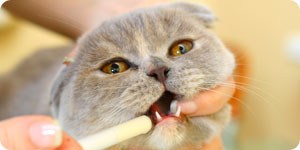
Feline distemper, or panleukopenia, is a serious disease most often seen in kittens under age five months. The disease is often fatal in kittens, although older cats may have a better chance to survive.
- Feline panleukopenia is a viral disease, and the causative virus is shed in most cats’ secretions and excretions. It can even be passed along by a mother cat to her kittens in the womb. It is transmitted most often by fleas. The virus is a hardy one, and can live for years. Most antiseptics and disinfectants have no effect on it. The virus may be killed by at least a 10-minute immersion in bleach.
- The first symptom of panleukopenia is usually a sudden, high fever. By about 48 hours after the fever’s appearance, the cat will not eat, and often starts vomiting. Depression, diarrhea and dehydration follow. Hemorrhage of the intestines may follow as the disease progresses.
- Veterinarians often diagnose panleukopenia empirically. They look at the cat’s symptoms, find a low white-cell count (hence the name “leukopenia”) and make their diagnosis. Test kits are available, but veterinarians are usually able to accurately diagnose the disease without them.
- There is no cure for the virus that causes feline panleukopenia, but supportive care, including IV antibiotics and fluids, may be effective. The goal is to keep secondary infections from setting in and to keep the animal hydrated so it can fight the infection. Recovery may take several weeks, as the cat regains lost weight and strength.
- Obviously, prompt care by a veterinarian is crucial in helping a cat survive this disease. Pets should be taken to the vet at the first sign of illness, since early supportive care is critical.
- The good news in all this is that distemper is entirely preventable. Safe, effective vaccines are available for the disease, and any veterinarian can administer them. Vaccines of choice are either killed virus, or weakened virus. Killed virus vaccines are good for very small kittens and pregnant or nursing mother cats. They are not as effective as quickly, but they also pose no hazards for the fetal kittens or to newborns.
- Weakened virus vaccines are effective more quickly, but must be used with more caution. They are generally used for older kittens, or for adult females who may soon be bred. A weakened virus vaccine could make a small kitten seriously ill, and could cause abortion in a pregnant female cat.
Keeping a clean home and making sure your cat is up to date on all vaccines is always the best way to prevent feline illnesses.
